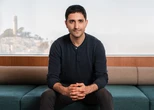It had begun nearly two years prior, with a miscarriage, and then another. I was compiling a list of fertility clinics when he made an appearance on the ultrasound monitor, a flickering response to my quietly brewing despair.
I spent the long months of pregnancy that followed feeling like a cartoon character with a me-size thunderstorm threatening at every turn. Though my pregnancy was healthy, I was convinced I had to remain vigilant until my son was in my arms. When my husband and I visited my obstetrician nine days past my son’s due date, I wasn’t surprised to see an irregularity in his heartbeat. Less than an hour later, we were checking into the hospital to start my induction. Later that night, my son’s heartbeat dropped again, prompting a small army of doctors and nurses to rush the delivery room. But he recovered, my body stopped resisting, and then it was over. We sat together in the emptied room, my son curled against my husband’s chest, his tiny hat askew. Here was my family.
Do our beginnings matter? It’s the question at the heart of Orchid, one of a new wave of companies performing genomic screening on human embryos. Roughly 40% of in vitro fertilization (IVF) cycles today include genetic screening, but in almost all cases, the tests are a relatively rudimentary gauge of obvious chromosomal abnormalities, with results similar in scope to a prenatal amniocentesis test. Orchid and its competitors, all of which were founded within the last decade, assess embryo health in a far more comprehensive, and potentially more radical, way.
For Noor Siddiqui, Orchid’s 31-year-old founder and CEO, old-fashioned origin stories, like my son’s, are the equivalent of “rolling the dice,” as she often says. She doesn’t yet have children, but she and her husband hope to someday have two sons and two daughters. To prepare, she has frozen more than a dozen embryos, and plans to retrieve even more eggs. In keeping with Orchid’s protocols, her embryos have been biopsied; the DNA contained in those four- to six-cell biopsies has been amplified; and the resulting genomic data has been sequenced and scored for chromosomal abnormalities, as well as cancer, autism, diabetes, birth defects, and hundreds of other diseases and disorders.
The most important parenting decisions anyone can make, Siddiqui argues, happen before birth: your choice of partner and your child’s genome. She views screening embryo genomes as a form of preventive medicine. “For the first time ever, parents can mitigate a massive amount of risk that was previously left to chance,” she says. She imagines that future couples will start their parenting journey as she did, by reviewing a data-rich, tastefully designed embryo report for each of their prospective children. They will be able to remove from consideration any embryos with serious and often rare monogenic conditions, such as cri du chat syndrome, and compare relative risk on more complex conditions, including intellectual disability and schizophrenia.
Siddiqui has no doubt that the practice will one day be widely accepted, and essential.
“I started this company because I was pissed I couldn’t have a baby the way I wanted,” Siddiqui says when we meet on a misty afternoon in June for a walk along the Chicago lakefront. It’s her first venture outdoors after a day in hotel meeting rooms alongside attendees of a reproductive medicine conference, where she was a featured speaker trying to convince an audience of physicians that patients undergoing IVF would benefit from Orchid’s tests.
Like many of Orchid’s customers, Siddiqui’s life has been shaped by genomic disease. Her mother’s DNA contains a de novo mutation that has slowly destroyed her vision; today, she is legally blind. At Stanford, where Siddiqui studied computer science as an undergraduate and in a master’s program, classes on artificial intelligence introduced her to the possibilities of applying deep-learning techniques to genomic data. The merging of computational science and genetics was a revelation. “I saw what happened to my mom,” she says. “I don’t want [my children] to suffer.”
Since its founding in 2019, Orchid has evaluated thousands of embryos’ whole genomes, at an out-of-pocket cost of $2,500 per embryo. (Couples who use Orchid screen an average of five embryos.) Orchid partners with IVF clinics to ensure that embryo biopsies are performed according to its guidance and then amplifies the embryo DNA for analysis at its own clinical labs.
Traditionally, IVF clinics evaluate embryos according to their morphological grade, which assesses the number and quality of cells in an embryo. If the clinic orders genetic testing, it is typically a test known as PGT-A, which can detect diseases like Down syndrome, caused by an extra copy of chromosome 21. (The “A” in the test’s name refers to aneuploidy, or an abnormal number of chromosomes.) Orchid goes further. In addition to scanning for hundreds of rare single-gene mutations, it uses statistical techniques to generate polygenic risk scores designed to gauge an embryo’s predisposition to complex but often common diseases, such as hypertension and coronary artery disease.
Because polygenic conditions are influenced by behavior and environment in addition to genetics, the value of their associated risk scores is hotly contested within the research community. Being told one embryo has less risk of hypertension or coronary artery disease than another does not preclude a future diagnosis. But that hasn’t stopped couples with a family history of hereditary disease and considerable financial means from flocking to Orchid. “My inbox is all babies,” says Siddiqui.
But critics are circling too. Siddiqui’s observation that “sex is for fun, and embryo screening is for babies,” which she first voiced in a YouTube video in 2021, has become a polarizing catchphrase. A fertility specialist appearing on 60 Minutes echoed it with pride, but ethicists wary of a designer-baby future point to it as a sign of Huxleian doom.
As she gamely walks the waterfront in a black blazer and sensible heels, Siddiqui’s frustration with the status quo is palpable. “I think it’s insane that we go to these doctors, talk to these conferences, and they’re grappling with, oh, this is too much information” to share with patients, she says. “Well, I’m going to have a lifetime of medical bills and a child who’s always going to suffer from an incurable disease because you didn’t want to look at a little bit of extra information. You didn’t want to spend five extra minutes with me telling [me] all the options for the most important decision of my life. And that enrages me.”
But an intervention like Orchid doesn’t just reduce suffering; it also introduces choice and control to the reproductive process in unprecedented ways. Through the ages, children have been viewed as a gift (sometimes an unwelcome gift, but a gift all the same). After meeting with Siddiqui, Orchid provides me with a sample embryo report to review. Looking at it, I have the uncomfortable feeling that I’m looking not at a gift, but at a product—indeed, a luxury product. Am I getting a winner or a dud? Does the promise of increased health span justify the cost of the service? The process rewards couples with the economic means to produce a multitude of embryos, and, by its very nature, encourages consumer-directed optimization. And, throughout, there’s the unspoken, but implied directive: May the best baby win.
When Jeff’s wife suffered two early-term miscarriages, he felt helpless. The couple started looking into IVF, hoping to find a way to prevent further losses.
Jeff, a prominent startup founder himself, heard about Orchid through a colleague who had been advising Siddiqui. He was surprised to learn that some embryos with genetics that are not compatible with life can still generate high morphological grades on traditional IVF tests. When such embryos are implanted, they tend to miscarry. Orchid’s screening process offered a solution, combining PGT-A with scores for 1,200 monogenic conditions and a dozen polygenic conditions—including Alzheimer’s disease, which runs in Jeff’s wife’s family.
Jeff’s wife went through two rounds of egg retrievals. The couple spent upwards of $25,000, in addition to their IVF costs, to screen the resulting embryos with Orchid’s technology and welcomed a first baby last year. Jeff was so taken with Orchid that he became an investor.
“Everyone tries to provide a better life for their kids, wants to send their kids to the best school,” he says. “Why would you not want to give your child the highest probability of health success?” And as a society, he argues, we should be trying to “eradicate disease” and “improve our gene pools.” He hopes to see federal support for embryo screening, paving the way to lowered costs and greater access. (Eleven states require insurance to cover IVF and fertility preservation; no legislation currently addresses embryo screening.)
Perhaps not surprisingly, Orchid’s earliest and most vocal customers and supporters have been a who’s who of Silicon Valley elites, products of a culture where data is prized, longevity is hackable, and children follow after career success. Orchid has raised $12 million from the likes of 23andMe founder Anne Wojcicki, Coinbase founder Brian Armstrong, and Ben Lamm, cofounder of the dire wolf–reviving startup Colossal Biosciences.
For Siddiqui, who completed the fellowship program for young entrepreneurs founded by libertarian iconoclast Peter Thiel, Orchid’s emphasis on consumer choice is a feature, not a bug. She has spent time with Orchid parents and their Orchid babies; she trusts them. “I think consumers are smart,” she says. “At the end of the day, what I love about the world is that the arc bends toward good.”
Indeed, if there’s a theme common among the leaders of embryo-screening companies, it’s a sense of befuddlement, even exasperation, at the wary reception they have received in clinical circles. Many of these founders, like Siddiqui, have been affected by genetic or chronic disease. When professional organizations like the American Society of Human Genetics caution against the use of polygenic embryo screening in clinical care, it’s personal.
Nathan Treff, cofounder and chief scientific officer at Orchid competitor Genomic Prediction, developed type 1 diabetes in early adulthood. His research, which relies on a database of DNA from adult sibling pairs, suggests that couples using Genomic Prediction’s polygenic risk scores for embryo selection can reduce the odds of their child having type 1 diabetes by at least 45%. “Don’t you think it’s unethical not to tell patients with diabetes that this was an option?” he says.
In June, Genomic Prediction announced a partnership with Nucleus Genomics, a genetic health company founded by another former Thiel Fellow, Kian Sadeghi. Genomic Prediction oversees the wet lab process by which embryos are biopsied and their DNA is amplified; Nucleus receives the raw DNA data and conducts its own proprietary analysis.
“We believe in genetic optimization,” Sadeghi told Core Memory podcast host Ashlee Vance in June. “We believe [that] if couples want access to height or IQ or hair color or eye color or alcohol dependency, they should have access to that. And the other thing is we really believe in the consumer deciding.” As Nucleus’s website puts it: “Understand your embryo’s future body, mind, and health,” starting with traits like male-pattern baldness and severe acne.
Orchid doesn’t offer information on cosmetic traits in its reports, and Siddiqui has consistently insisted that Orchid is focused on preventing disease. But the line between markers of disease and mere traits is blurrier than it might first appear. Height is a trait—yet pulled to its extremes, it becomes idiopathic short stature or Marfan syndrome. Plus, there are correlations between theoretically desirable traits and less desirable ones for reasons that scientists have yet to untangle. For example, educational attainment—a proxy for IQ—is negatively correlated with traits including conscientiousness and extraversion, and positively correlated with autism spectrum disorders and anorexia.
To some researchers, even Orchid’s focus on disease is problematic. They would like to see companies performing embryo screening connect their abstract polygenic risk scores to real models of disease in more concrete ways. For example, a risk score for obesity, which presents as a spectrum of symptom severity, is not the same as a risk score for cancer. “There’s no such thing as half cancer,” writes Sasha Gusev, a statistical geneticist and associate professor of medicine at Harvard Medical School, in his Substack The Infinitesimal. Orchid and its peers struggle to communicate these distinctions, at the risk of fostering false hope—or worse, false certainty—among their customers.
Companies like Orchid are still far too young to have a systemic impact. But already, researchers are hypothesizing about how embryo optimization might play out on a population-level scale. Patrick Turley, director of the Behavioral and Health Genomics Center at the University of Southern California, was lead author of a 2021 paper outlining problems with the use of polygenic risk scores in embryo selection. He foreshadows a world in which cost-focused nationalized healthcare systems, in particular, might lead the way in embryo screening. “What’s the cost-benefit analysis?” he asks. “If you could reduce someone’s diabetes risk by three or four percentage points, what does that mean in terms of lifetime medical spending, but also quality of life in the future?”
There is something undeniably appealing about de-risking reproduction and lowering lifetime medical costs. Siddiqui’s preferred metaphors—rolling dice, winning or losing the genetic lottery—make nature’s reproductive methodology appear haphazard, even capricious. Embryo screening, in contrast, seems like a safe and responsible approach. But of course, Siddiqui’s portrayal is incomplete. There is intelligence and optimization built into nature’s design, even if it does sometimes lead to loss. More than half of first-trimester miscarriages are the result of chromosomal abnormalities. My miscarriages caused great grief, but they were also, likely, safeguarding me.
Was my son, in the end, the “best” baby, and is he now the “best” 6-year-old? The question is almost absurd—am I the “best” mom? All I know for certain is that he’s mine.









No comments